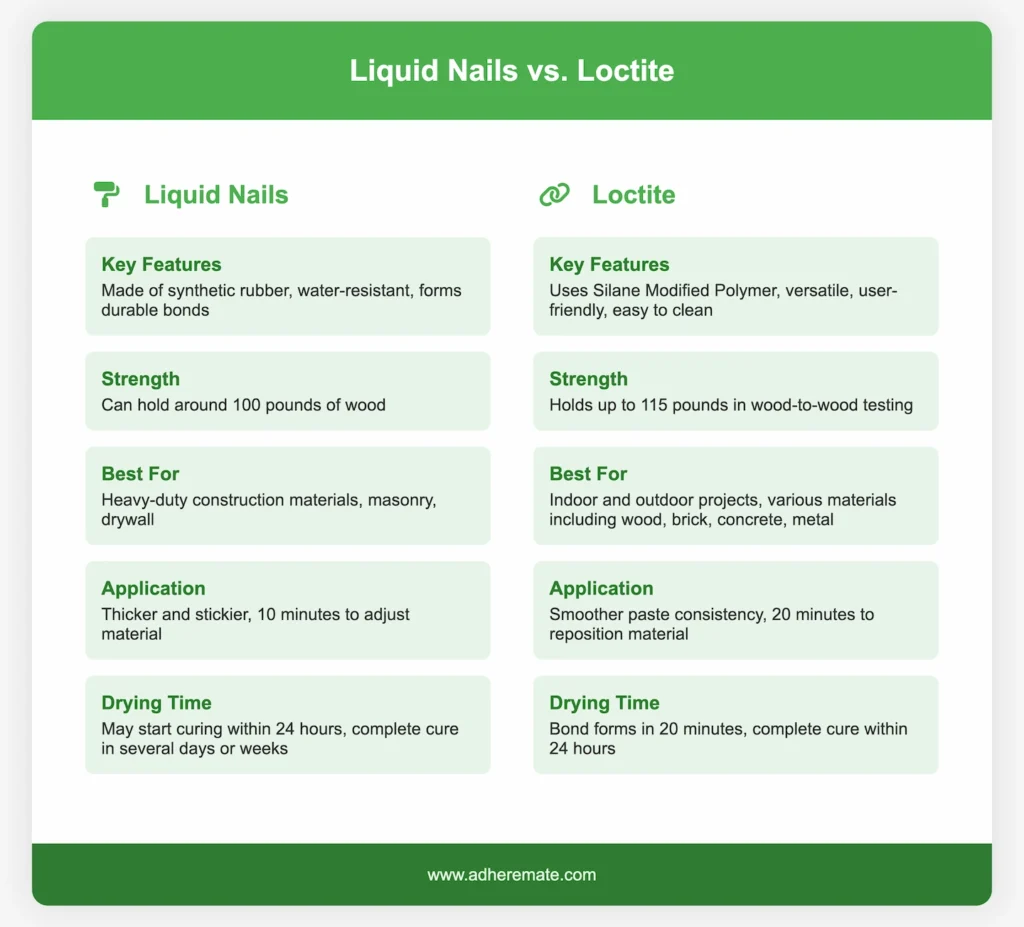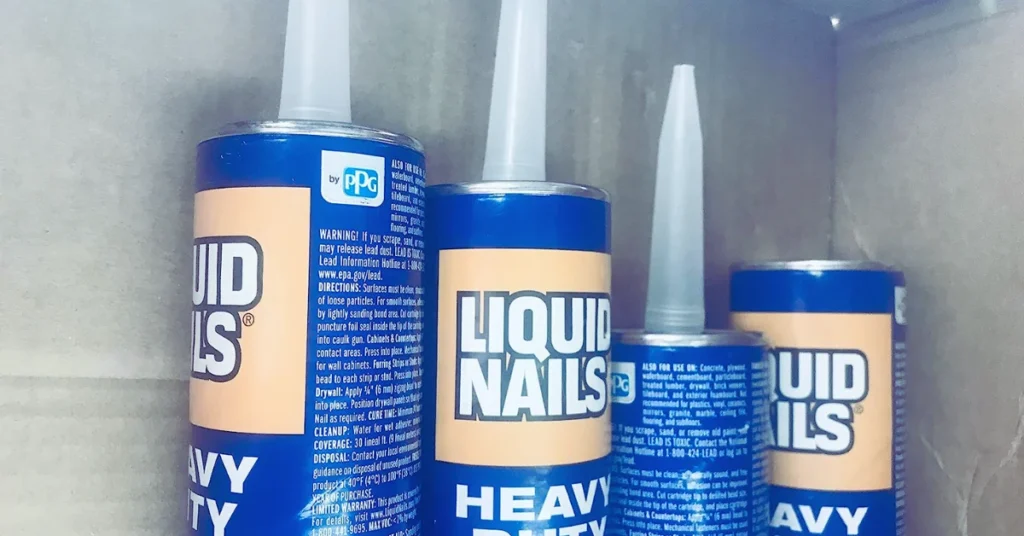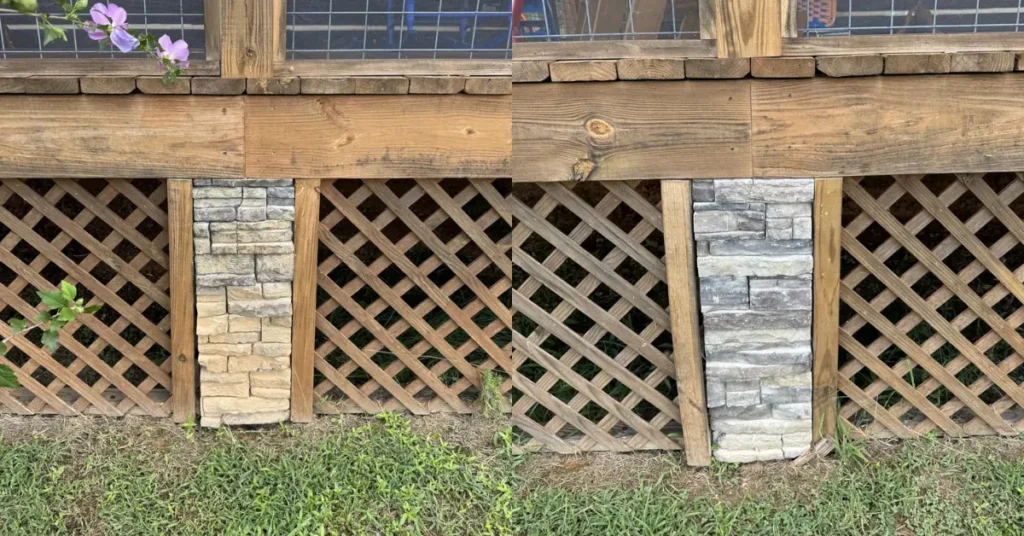Companies have produced so many construction adhesives that choosing the best is almost impossible. That’s why I will compare Liquid Nails vs. Loctite to see which is better.
Loctite Construction Adhesive uses Silane Modified Polymer for a super strong bond. Liquid Nails, made of synthetic rubber, is water-resistant and forms durable bonds.
Read the full article for a quick comparison between Liquid Nails and Loctite construction adhesives.
Read More: Liquid Nails vs. Loctite
Article Highlight
- Loctite offers a stronger bond and better versatility
- Liquid Nails is known for its strong bonding capabilities
- Loctite is made from Silane Modified Polymer and liquid nails from synthetic rubber.
- Liquid Nails is hard to clean, and Loctite is easy to clean.
Is Loctite As Good As Liquid Nails?
Yes, Loctite is often considered as good as Liquid Nails. There are various reasons to think Loctite is better than Liquid Nails.
First, Loctite offers a stronger bond and better versatility. It works well on various materials, even in tough conditions like extreme temperatures or wet surfaces.
I prefer the Loctite PL Premium Max Construction Adhesive for my indoor and outdoor projects. It sets quickly and helps me finish projects faster.
Loctite also stays flexible after curing, helping prevent cracks over time. One prominent advantage of Loctite is that it does not create air pockets, allowing for better flexibility.
The fact that Loctite is better does not mean Liquid Nails are inferior. I would always choose Liquid Nails Heavy Duty Construction Adhesive. for heavy-duty construction materials. It creates the strongest bond for heavy construction materials.
While Liquid Nails is reliable, Loctite’s performance in durability and adaptability makes it a preferred choice for many construction projects.

Liquid Nails vs. Loctite
Bond Strength
Loctite Construction Adhesive creates a strong bond. It holds up to 115 pounds in wood-to-wood testing. This means you can use Loctite for heavy-duty applications like framing and structural projects where maximum strength is crucial.
Liquid Nails is also known for its strong bonding capabilities. It can hold around 100 pounds of wood. 100 pounds of bonding strength is sufficient for most construction tasks. Despite this, it is not as strong as Loctite.
However, for woodworking, the comparison between Liquid Nails and Wood Glue might provide better insights depending on your project needs.
Versatility
Loctite PL Premium MAX is highly versatile. It can bond wood, brick, concrete, metal, stone, and fiberglass, making it perfect for indoor and outdoor use. It can also perform well in extreme temperatures (from -10°F to 120°F) and on wet or frozen surfaces.
While Liquid Nails is also versatile, it’s more specialized for specific materials such as masonry or drywall. However, it can effectively bond bricks, plywood, and other dense materials in heavy construction.

Chemical Composition
Loctite is made from Silane-Modified Polymer. This advanced polymer creates a 100% solid bond without air pockets to ensure long-lasting adhesion.
Their technology makes it flexible for applications that experience material movement or expansion.
Liquid Nails primarily uses synthetic rubber, which offers good flexibility, water resistance, and weather resistance.
While Liquid Nails may not perform as advanced as Loctite, it still forms a strong bond for heavy construction materials. It’s reliable for many projects where quick and effective adhesion is needed.
Application Process
Loctite features a smoother paste or cream consistency that makes it easy to apply. You will have 20 minutes to reposition the material during the application process. The Paste-like consistency helps minimize mess and enhance control.
Liquid Nails tend to be thicker and stickier, which can make them messier and harder to apply evenly. You will have 10 minutes to adjust the material, so you may require quicker decisions and actions.
Drying Time
Loctite takes around 20 minutes to bond forms. The complete cure happens within 24 hours.
Liquid Nails may start curing within 24 hours but can take several days or weeks to achieve complete curing.
Curing depends on environmental factors like temperature and humidity. Due to the slow curing times of both adhesives, your project will likely be delayed.
Weather and Water Resistance
Loctite construction adhesive excels in weather and water resistance. As a result, it’s ideal for outdoor projects exposed to rain, snow, and UV light. Its waterproof nature allows application on wet or frozen surfaces, which is crucial for construction in challenging conditions.
Liquid Nails is also water and weather-resistant. It can work under extreme temperature and pressure.
Flexibility
Once cured, Loctite remains flexible, allowing it to adapt to material expansion and contraction without breaking the bond. This quality is essential for projects that experience temperature fluctuations, ensuring longevity and durability.
Since Liquid Nails is also made for heavy construction, it can be flexible like Loctite. Both adhesives can endure heavy pressure and won’t crack.

Clean-Up
The smoother consistency of Loctite makes clean-up easier. You can remove excess adhesive with minimal effort before it cures, saving time and hassle.
In contrast, Liquid Nails can be difficult to clean, particularly once it starts to cure. Its tacky texture can make it harder to remove from surfaces, tools, and skin, potentially complicating your project.
Drawbacks
Liquid Nails can be messy and have a strong odor. Loctite, on the other hand, offers a stronger initial bond but may require additional clamping or pressure to hold surfaces together until it fully cures.
Editor’s Opinion
I’ve tried both Liquid Nails and Loctite for home projects. I like Loctite better because it’s more versatile and dries faster.
It works well with different materials and holds things together quickly. Liquid Nails is also strong, but it can be messy to clean up.
If you need a reliable, easy-to-use adhesive, I recommend Loctite. It’s a great choice for most home improvement tasks. However, if you need a strong, weather-resistant adhesive for construction materials, use Liquid Nails.
For a broader range of materials like wood or concrete, Gorilla Glue vs. Liquid Nails offers a closer look at how these two adhesives perform, especially in different types of construction projects.


